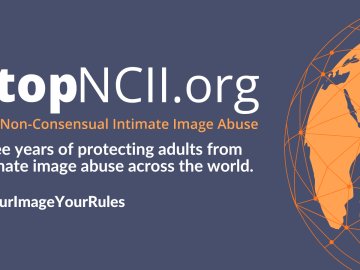A new, ground-breaking online platform Minerva is being launched by SWGfL in partnership with the Department for Digital, Culture, Media and Sport (DCMS), funded by the Tampon Tax Fund.
Minerva is a pioneering tech driven solution that will give victims of online abuse an opportunity to report and remove online harm. It will give them more control in how they make reports and share information whilst ensuring confidentiality remains intact.
Impacts of Online Abuse
New research has shown family and friends have been identified as the first port of call for help when a victim is being abused online, while alarmingly, stranger danger resulting in online abuse has increased. Added to this, one in three victims report online abuse to social media moderators, while one in four will never report to anybody.
The research for Minerva, was undertaken by the University of Suffolk and has highlighted the need for a platform like Minerva. The study looked into the impacts of online abuse and behaviours which negatively affects a victim’s ability to safely navigate online and offline spaces, as well as the importance of linking patterns of online and abuse and offline gendered violence.
Sophie Mortimer from the Revenge Porn Helpline (operated by SWGfL) said there was often an intrinsic link between online and offline abuse and that different incidents, such as stalking, abusive messages, intimate image abuse or ringing in the middle of the night, were all indicative of a pattern of behaviour.
“We wanted to join the dots in a victim-centred way and the Minerva Project came from a desire to give victims a platform which helps them to do this,” said Mortimer.
The platform will provide resources and tools to provide that much needed support and will also signpost victims to the necessary channels for help.
This new platform will importantly eliminate the need for the victim to try and find different avenues of support relating to various incidents of abuse, which can be time-consuming and ultimately discouraging for a victim who needs immediate support. Minerva will provide all types of support in one place including the services of STOPNCII, Report Harmful Content and the Revenge Porn Helpline.
What Did The Research Show?
The research stage of Minerva, took place from March to mid-July 2022. Research included surveys with 148 women with lived experience of online abuse or Technology Facilitated Violence Against Women and Girls and 58 professionals who work in the field, as well as interviews and other published research.
It investigated the different forms and impacts of online abuse, as well as identifying gaps in support and what reporting options are currently available, taking into account the needs and expectations of women subjected to online abuse.
The research findings highlighted that a range of emotional, psychological, social, behavioural and professional harms, often long lasting, resulted from online abuse. It also highlighted that there is a lack of specialist and longer-term support options for women. This was coupled with systemic issues in the police and justice sector, as well as a lack of knowledge and training within VAWG organisations due to the rapid changing pace of technology.
Key findings from the research include :
- The most commonly experienced forms of abuse were unwanted sexual messages (61%), cyberstalking or harassment (44,9%), receiving unwanted violent or pornographic content (36,4%), hate speech (33,9%), threats or blackmail (33,1%).
- Over half of the respondents indicated that their perpetrator was a stranger (53,8%), while 22,7% identified a former partner, with the least frequent response (1,7%) being a family member.
- Cyberstalking, harassment and receiving unwanted sexual messages were identified as the most enduring forms of abuse. This could be linked to unconnected messages from different perpetrators, such as in cyberflashing or collector culture.
- Close to 45% of respondents indicated they had reported their abuse to family or friends and for formal reporting avenues, 28,% reported to social media moderators and 25,4% reported to the police. Almost a quarter of respondents (24.6%) indicated that they had never reported what had happened to anybody.
- Abuse duration periods ranged from 1-6 days (21%) to 2+ years (1,6%)
- Online abuse resulted in a range of negative emotional impacts such as anxiety (62,2%), stress (53,8%), anger (52,1%), trauma (23,5%), panic attacks (19,3%), as well as other issues such as fear of home address being shared, suicidal feelings and previous trauma being triggered.
- Social impacts included loss of confidence (57,3%), feeling isolated (37,6%) and bullied (34,2%), as well as issues such as loss of trust in people and worry over children’s safety which highlighted the ‘real world’ impact of online abuse. Loss of control over major aspects in life was also highlighted as a recurring issue.
- Behavioural impacts included more than half (55,9%) of participants stopping or reducing their online interaction, 47,5% stopping or reducing their social media and 39% expressing themselves online. This underlines the ‘silencing effect’ of online abuse which directly limits women’s freedom of expression and access to public spaces.
- Women were more likely to be affected than men.
- Gaps and barriers included legislative loopholes, poor police response (primarily due to a perception of less likely physical harm from online abuse and jurisdictional issues), and a lack of technological knowledge in VAWG services.
Minerva will be launched in 2023.
More details about Minerva and how it can support victims of online abuse can be found here.






